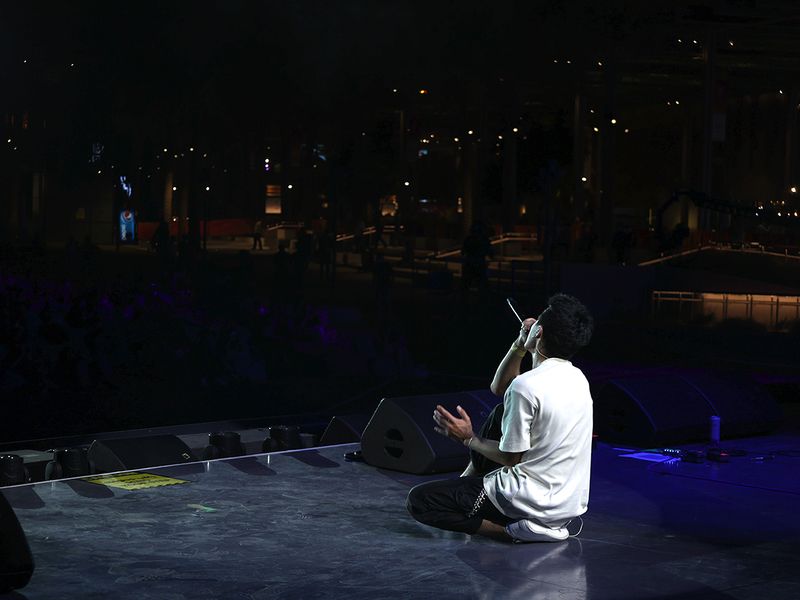
The cosmos is constantly thrumming with music, it’s just that we can’t hear it. Nothing gets more alien than outer space music when Saturn sings a windy tune with a rapid clicking, while Jupiter produces an unpleasant nails-on-a-chalkboard scraping. Twenty-two-year-old singer-songwriter Flangr (pronounced flang-jer) felt the same level of spook when listening to Orion Nebula samples for his music.
“The first time I listened to it, I was scared. I was alone in the studio,” the Chilean dark pop artist told Gulf News in an interview, just a day after his first Space Week show at Expo 2020 Dubai’s Jubilee Park. “But the question that immediately came to me was ‘how can I use this in music?’”
A childhood obsession with the space epic Star Wars and mysterious UFO sightings took Joaquín Macaya down a road less travelled. It was the simplest way he could think of to introduce astronomy to the masses, saving them the trouble of nosediving into scientific journals and books. Though he references astronomer and author Carl Sagan often in conversation, instantly perking at the mention of the 1994 non-fiction ‘Pale Blue Dot’.
“Space gives me a sense of mystery and adventure. I mean, I can’t travel to Saturn yet, but just knowing that it exists gives me some sort of power,” said Flangr.
Collaborating with ALMA
But then how does one compose a pop number with the eerie murmurs of deep sky objects? Flangr’s lifelong quest led him to the cosmic audio library of ALMA (Atacama Large Millimeter and Submillimeter Array) in northern Chile – an array of 66 radio telescopes that studies the first stars and galaxies. When he and his producer El Rosa put their heads together, they created something no other artist in the world has put out yet.
“It’s daily music, you know. Something you can listen to on Spotify or on the radio when you’re driving – not a 15-minute instrumental,” he added. “It took a long time to master the raw files. Every song has a different space sound.”
And space music is not what you expect. You might jam along to Flangr’s three special shows at Expo, but there is good chance the atmospheric soundscape of track ‘Nobody’ will not register as sound waves from the Orion Nebula. Flangr says ‘Pero’ is an alien track from start to finish, minus the vocals and guitar strings.

Space jams and how they work
Science tells us sound doesn’t travel in space because it is a vacuum. ALMA astronomer, Antonio Hales along with Universidad de Chile engineer, Ricardo Finger looked at the electromagnetic readings of the three-million-year-old nebula and wondered what if its radio waves were slowed down to mimic sound waves. The result? Each spike in the graph line sang a different tune.
When Flangr proposed a collaboration in a meeting, which he says took months to calendar, Observatory ALMA took the leap with him. Waves from the Orion Nebula take 1,344 years to reach the Earth, and the singer has been experimenting with the millennium-old samples since last November.
Flangr has taken his space tunes to the US on a tour, but he calls his performance in Dubai the best one yet. Visitors of Expo 2020 can catch him strumming his guitar to dreamy cosmic tracks next on October 21 at 3pm on the Jubilee Stage, his last show of the three. He looks forward to exploring other pockets of the universe for future releases.
“Just let yourself go and watch movies – I would recommend Interstellar and Ann Druyan’s Cosmos documentary, then to read books on space, after which you can listen to my songs,” he said on advising the general public to embark on their own intergalactic voyage.








